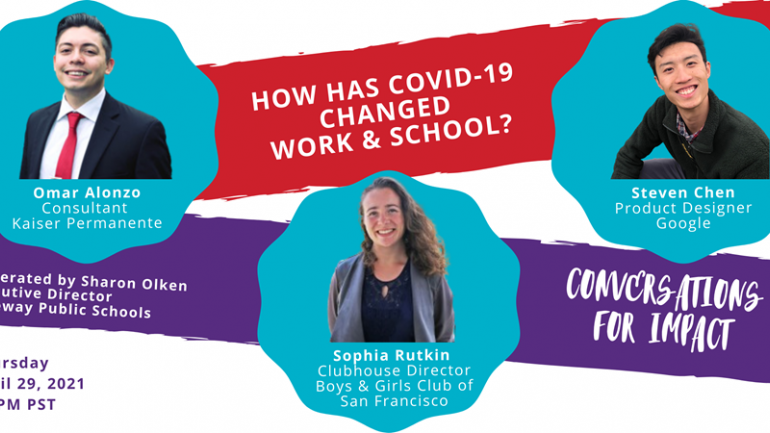
After a nearly year-long hiatus, Gateway’s popular event series Conversations for Impact returned last week with “Conversations for Impact: How Has COVID-19 Changed Work and School?” To answer such a challenging and significant question, we turned to a panel of Gateway alumni working in disparate sectors -- tech, healthcare, and youth development -- for an in-depth conversation with Executive Director Sharon Olken about how schools can better prepare students for a workplace that has been irrevocably altered.
Despite their varied paths after graduating from high school, the alumni panel found much to agree on over the course of the evening.
“Networking, networking, networking,” said Omar Alonzo (Class of 2013), a consultant at Kaiser Permanante. “Relationships are only going to become more important over time. High schools can start supporting students with mentors and career exposure that make a huge difference.”
Panelist Steven Chen (Class of 2016), a product designer at Google, echoed this statement, reflecting that an internship opportunity he was exposed to at Gateway eventually led to him not only discovering his current career path but ultimately becoming hired full time at Google. Even in his highly technical role, he emphasized the importance of collaboration and relationship-building as foundation to success -- student agency skills that are emphasized at Gateway but aren’t always reflected as priorities in public school curriculum.
“How do you build rapport with someone? How do you establish relationships? Those are really important skills,” he said. “In my role, I meet new people every day, and being able to onboard new people well is very important. Trust between teammates is always crucial to project success, so how do you establish that trust, even virtually?”
For Sophia Rutkin (Class of 2011), Clubhouse Director with Boys & Girls Clubs of San Francisco, the question isn’t only how schools can be preparing students to be more effective in the workplace, but also how they can prepare students for a workplace that will continue to demand more of them.
“Schools can better support students in boundary setting. Because of technology I am constantly available, but I can’t be working all the time or I will drive myself crazy,” she said. “Schools can support boundary setting by giving students manageable workloads, and activities that support them in unplugging.”
While COVID-19 has undoubtedly shifted expectations for both employers and employees as we return to a more “normal” pace of life, panelists agreed that some of the most important skills for students to take with them into the working world -- whether they find themselves working in a Zoom meeting, a board room or a playground -- are timeless, and ultimately, pretty low-tech.
“As we continue to live in this tech-forward world, any opportunity to practice patience is valuable,” said Sophia.